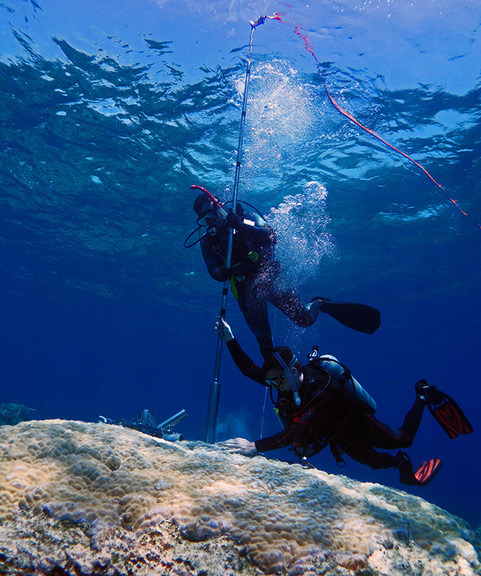The Coral Sea could soon be misnamed, scientists suggest, after reconstructing annual temperatures over the last four centuries. Recent record-breaking temperatures are so far outside the experience of even the oldest shallow water corals that the scientists are denouncing a recent decision to not list the Great Barrier Reef (GBR) as “in danger”.
Coral reefs thrive in a relatively narrow temperature range; after particularly hot summers reefs show extensive bleaching, which if maintained leads to coral death. This has been a major contributor to coral decline worldwide, including the GBR, the Earth’s largest living structure. Although these facts are agreed, some doubt remains as to how well corals can adapt to higher temperatures.
To help resolve this question, Dr Benjamin Henley of the University of Wollongong and colleagues drew on the fact that corals produce layers as they grow, like the rings of trees, which keep a record of seasonal conditions. These provide evidence of temperature and salinity, particularly in summer. With some shallow-water corals being 400 years old, this provides an opportunity to determine annual temperatures for every year back to the early 17th century.
There are no direct temperature measurements for the GBR’s waters before the late 19th century, allowing those who minimize the scale of the threat to the reef to suggest it may have faced such temperatures before and survived. Studies based on coral cores from two locations in the central GBR lent some support to this idea, but temperatures and bleaching have become worse since. Moreover, Henley and colleagues note that those studies averaged temperatures over five-year periods for a limited area.
The authors examined coral cores taken since 1900 and correlated them against instrumental records for those years. They used this and older coral samples to reconstruct summer water temperatures back to 1618. New techniques and larger sample sizes allow them to do this on an annual basis.
Although the authors find a pattern of warming and cooling cycles lasting decades, the data makes it very unlikely any summer in 400 years got close to the summer of 2016, which triggered widespread bleaching. There have been three hotter summers since then, and the authors consider these “extremely likely” to be hotter than any summer from 1618-1899.
Notably, the cores were collected not only from the GBR, but from reefs across the Coral Sea and some locations beyond. Not only are the average temperatures throughout the region higher than those of previous centuries, but records are being set at almost all the individual locations sampled. Attempts to model the causes show such a pattern is almost impossible without human influence on the global climate.
Cores of old boulder corals can reveal the annual growth patterns going back to the individual coral’s birth.
Image credit: Anne Hoggett, Lizard Island Research Station; copyright holder: Tom DeCarlo, tdecarlo@tulane.edu
Five of the years between 2004 and 2022 stand out well clear of any previous summer, and 2024 is far above even these. “When I plotted the 2024 data point, I had to triple check my calculations – it was off the charts – far above the previous record high in 2017. I could almost not believe it. Tragically, mass coral bleaching has occurred yet again this year,” Henley said in a statement.
When more than 400 summer temperatures for the Coral Sea are plotted six stand out, all this century, and 2024 is different again.
The authors point to previous evidence that even if the goals of the Paris Agreement to keep the world under 1.5°C (2.7°F) above preindustrial temperatures are met, 70-90 percent of corals on the region’s reefs will die. Replacement of more heat-adapted corals from elsewhere may help, they argue, but is no cure-all.
In this context, the authors are scathing about a decision last week by the UNESCO Heritage Committee to not list the GBR as in danger, despite those words being in the draft. “When you compile all of the evidence we have, it’s the inevitability of the impacts on the reef in the coming years that really gets to me,” Henley said.
Co-author Professor Helen McGregor agreed. “There is no ‘if, but or maybe’ – the ocean temperatures during these bleaching events are unprecedented in the past four centuries,” she said. “The Great Barrier Reef is facing catastrophe if anthropogenic climate change is not immediately addressed. The very corals that have lived for hundreds of years and that gave us the data for our study are themselves under serious threat.”
Henley does not want his work to be used to justify despair. “We can never lose hope. Every fraction of a degree of warming we avoid will lead to a better future for the human and natural systems of our planet,” he said. “We hope that our study equips policymakers with more evidence to pursue deeper cuts in greenhouse gas emissions internationally.”
The study is published open access in Nature.
Source Link: Record Ocean Heat In 400 Years Means Great Barrier Reef Should Be Officially "In Danger"
